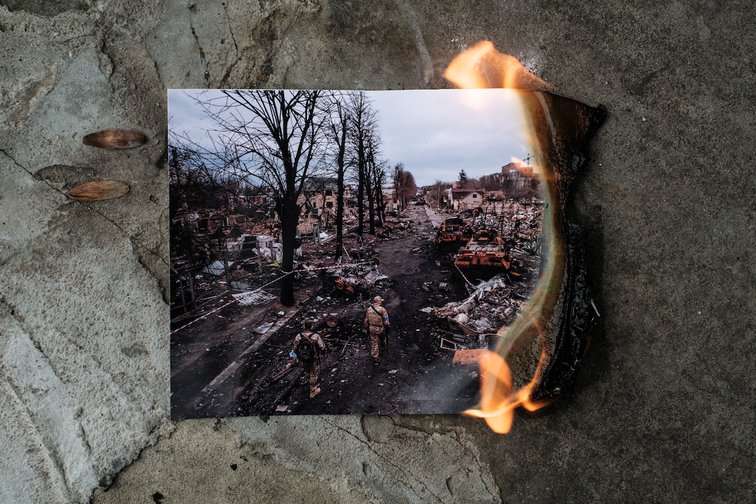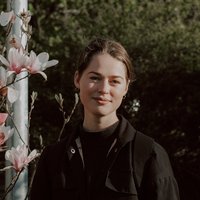On which side?
As if struck by lightning, the scorched bark splinters, twists and warps in horribly unnatural ways. It is terrible to look at. I realise this was probably the sculptor’s intention.
“I made this for Ukraine,” Peter tells me. Each summer the retired art teacher hosts an exhibition, and this year’s proceeds will go to a local charity supporting refugees.
The room is packed with Peter’s paintings, posters and personal belongings. No wall or floor is left bare. We stand shoulder to shoulder, admiring his latest piece. Behind the sculpture “for Ukraine” hangs a pen-and-ink drawing: a delicately sketched dove circles the bold outline of a symbol at once familiar and distant, recalling sit-ins and marches long before my time. I stare at the peace sign. Never before have I considered its trifurcate form. Now, I see a trident, inverted and encircled.
Peter follows my eye. He smiles. “As you might have guessed, I’m something of a pacifist.”
I turn to him. “Does that mean you are against arming Ukraine?”
Peter keeps smiling. He does not reply.
*
“It’s not common to talk about the war in this part of Europe. People try to distance themselves as soon as they hear where I’m from. It ends the conversation immediately.”
Sasha looks down at her lap. The tiny webcam distorts the space between her face and laptop, shortening the last stretch of distance between us.
“Sometimes I feel strong and motivated to keep talking about the war. But other days I feel like my voice means nothing. I keep shouting and no one listens. Our allies send us limited weapons deliveries. Just enough so that we can fight back. But not enough to take back our territories. And to suggest Ukraine gives up some of its territory… it crushes everything I believe in.”
We are speaking days after another so-called expert published an article proposing exactly that. Dozens of similar suggestions have appeared in the Western media, arguing that supplying weapons to Ukraine will prolong the war.
“In the country where I’m living now, the government is so loud about every tiny thing concerning people’s comfort. They do not understand that we had the same happy life in Ukraine before the full-scale invasion. They do not understand how fragile their comfort is.”
*
Inside the exhibit, people are swilling rosé and discussing how wonderful it is that art can be put to such good use. They look remarkably comfortable.
I used to come here for Peter’s weekly classes. I can still hear his teacher’s voice; the authoritative advice administered in short, sharp soundbites as he strode about the room appraising our work.
“Revel in the ambiguity.” This was a favourite. “There is no black, only varying degrees of shade.” Like most art teachers, Peter forbade his students from mixing colours with black. We were lectured on the intricacies of light and dark, on how to blend charcoal to create the perfect graduated shade.
Peter told us to “make use of the negative space” – the space around and between the subject of an image. Peter’s go-to example for new students was Rubin’s vase, the optical illusion where the curves of a vase suggest the outline of a forehead, nose and mouth on either side, bringing two profiles face to face in an awkward stare-off.
Negative space, Peter goes on, is defined by its relation to the subject. It has none of its own defining details, but the eye invites the mind to fill in the blanks.
*
“I’m tired of correcting colleagues’ use of the word ‘conflict’,” Sasha says. And she looks it. Her gaze is down. The lines around her eyes – incrementally inscribed by an instinctive impulse to smile in almost every scenario – have been overtaken by a creeping bruising, the colour of worry and exhaustion.
“I’m sick of hearing their latest theories. The US this, NATO that. Not everything is about their academic debates. We’re fighting for our existence. Edging a Ukrainian flag into your username doesn’t give you the right to say stupid shit.”
A new thought crosses Sasha’s face and she smiles. “Actually, did you see that tweet the other day? The one asking if people ‘understand how bad things are getting in Germany’?” The widely retweeted – and widely ridiculed – post rings a bell.



Comments
We encourage anyone to comment, please consult the oD commenting guidelines if you have any questions.